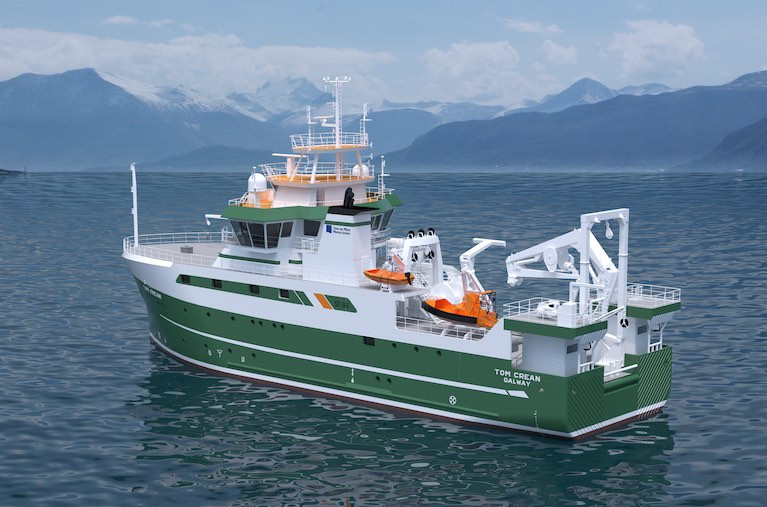Displaying items by tag: Equipment Stats
As Afloat first highlighted the Marine Institute's name of RV Tom Crean chosen for the new €25m research vessel due for delivery in Autumn 2022, is to feature a suite of the latest state of the art technology equipment, writes Jehan Ashmore.
RV Tom Crean of 52.8m will be one of world's most advanced research vessels is to directly replace the smaller RV Celtic Voyager of 31.40m and of 23 years service having operated duties in more inshore waters.
While the larger fleetmate, RV Celtic Explorer of 65.5m dating to 2003 will be joined by the newbuild to carry out an extensive capability of marine research activities. They include vital fisheries data (incl. EU Common Fisheries Policy), Irish seabed mapping (INFOMAR) and oceanography and critical climate change related research given this year marks the start of the UN Decade of the Ocean (2021-2030) and its urgency.
The newbuild was commissioned by the Department of Agriculture, Food and the Marine with the approval of the Government of Ireland, to enable the State's national integrated marine plan, 'Harnessing Our Ocean Wealth' and the national Marine Research and Innovation Strategy.
Afloat can also reveal that RV Tom Crean will be around 1,900 gross registered tonnes, with the first block laid down on 4th November last year at the Spanish shipyard of Astilleros Armon Vigo S.A. So far, 19 out of 32 block sections constructed are in place, with September 2021 scheduled for starting a 'fitting-out' period of the semi-completed newbuild prior to the newbuild's commissioning around a year later.
The shipyard is working to a design of Norwegian naval architects, Skipsteknisk AS based in Ålesund which was awarded the work following a EU tender process. The design consultancy were also responsible for the RV Celtic Explorer which will be joined by RV Tom Crean in the M.I.'s homeport of Galway, strategically located on the western seaboard and with easy access to the North Atlantic Ocean.
Afloat contacted the Marine Institute since (their press release), for further details of the RV Tom Crean characteristics, in particular the all important aft work deck, where the primary action is to take place in water operations in depths down to 4,000m.
According to Aodhán FitzGerald, Research Vessel Manager of the MI, the RV Tom Crean will feature an articulated boom crane aft (6t@ 10m, 3T@ 15m), located on the aft-gantry. This will be largely used for loading science equipment and net and equipment handling offshore.
Mounted at the stern is a 10T A frame aft which can articulate through 170 degrees which is for deploying and recovering large science equipment such as remotely operated vehicle (ROV’s), towed sleds and for fishing operations.
The vessel also has a heave compensated CTD system (system for measuring water temperature, salinity and depth and for collecting water samples) consisting of a deepwater winch and Frame to allow CTD operations in water depths down to 4000m.
Part of the equippment will be a regulation MOB boat on a dedicated davit and the facility to carry a 6.5m Rigid Inflatable tender on the port side.
Also at the aft deck is where the 'Holland 1' Work class ROV and the University of Limericks 'Etain' sub Atlantic ROV will be positioned. In addition up to 3 x 20’ (TEU) containers can be carried.
The newbuild has been engineered to endure increasing harsher conditions and the punishing weather systems encountered in the North-East Atlantic where deployments of RV Tom Crean on surveys spent up to 21 days duration.
In addition, RV Tom Crean will be able to operate in an ultra silent-mode, which is crucial to meet the stringent criteria of the ICES 209 noise standard for fisheries research purposes.
Of course all this broad-tasking can only be achieved with a team combining 12 crew and 14 scientists accommodated in the research vessel with associated laboratory facilities. In addition there will also be an on board hospital.






























































